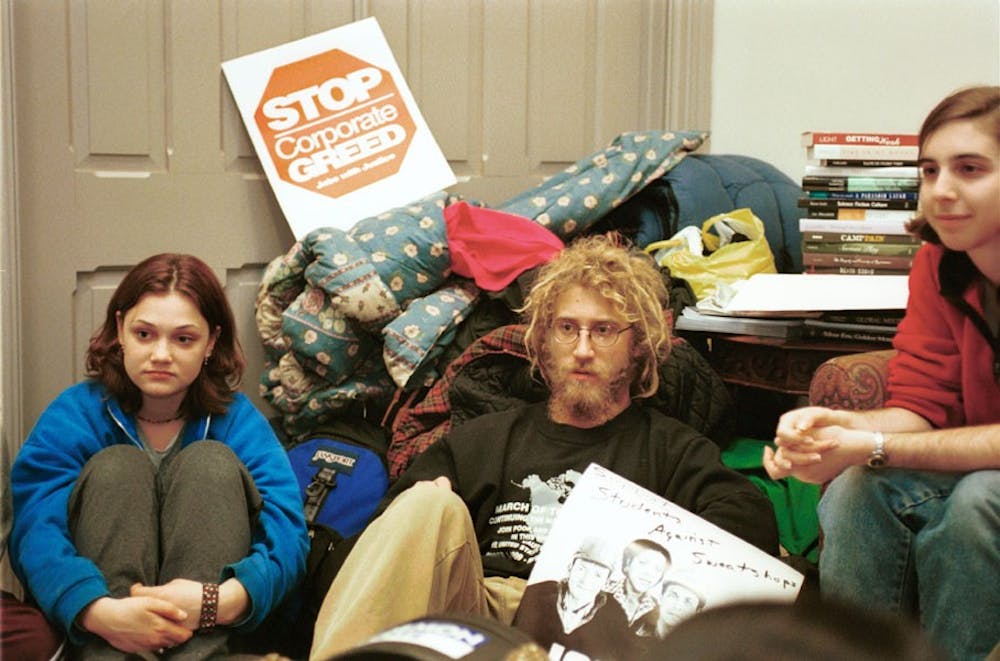
On Feb. 11, the Student Labor Action Project brought to campus two former workers from PT Kizone, a now-closed Indonesian factory which manufactured Adidas and other brands’ apparel. Citing shady business practices and inadequate wages, the workers asked Penn students to urge the University to end its relationship with Adidas.
After speaking to students about inadequate working conditions at an Adidas factory, two former factory workers also met with a committee within the University’s administration.
However, University had already begun investigating conditions at the factory last fall.
“We were doing our due diligence [on] this issue way before this was an issue in the news or students on this campus were educating themselves about it,” said Walter Licht, history professor and chair of the Committee on Manufacturer Responsibility.
The committee makes sure that the University holds true to its Code of Workplace Conduct for Penn Apparel Licensees. The code specifies that all items sporting the Penn logo should be ethically made according to its set of standards. This includes both items sold at the Penn Bookstore and used on the athletic field.
“What this committee does is review every single label that has the Penn logo on it,” Licht explained. “Our job is to review the latest practices and make recommendations to the president.”
Each spring, the committee recommends which brands’ contracts should be renewed and which should be dropped to President Amy Gutmann. These recommendations are also published in the Almanac.
While investigating the Adidas and PT Kizone issue, the committee interviewed a variety of people including representatives from Adidas and the workers who visited Penn last week. They also met with specialists from the Fair Labor Association and the Worker Rights Consortium, two monitoring organizations to which Penn belongs.
“We’ve gotten a pretty full chronology of the events [of what happened at the factory] and there has been some dispute,” Licht said. “It was very helpful to meet with the delegation of workers. They helped us sift through some of the differences.”
SLAP members hope that the meeting with the former PT Kizone workers will convince the committee that the Adidas contract should not be renewed.
“What I really hoped for was that the Committee on Manufacturer Responsibility would get a … firsthand account of what conditions are like in these factories and that they could make their judgment in part based on these stories,” said Chloe Sigal, the College sophomore and SLAP member who organized the event earlier this month.
The committee will make their official recommendations to the president later in the spring. According to Licht, they are currently working on finishing up the research on all the companies that create Penn merchandise.
CMR first convened in 2000 after a nine-day sit-in in then-President Judith Rodin’s office in College Hall by the student group United Students Against Sweatshops.
USAS led an anti-sweatshop campaign in 1999 and 2000. They asked the University to enact explicit language protecting worker’s rights.
They also wanted the University to join the newly formed Workers Rights Commission and leave the Fair Labor Association. Since apparel companies like Nike were part of FLA’s leadership, the students felt that the organization was a corporate attempt at whitewashing rather than a legitimate attempt to protect worker rights.
“This was not a legitimate organization which would make sure that workers had the right to join unions and protect their rights,” said Miriam Joffe-Block, a 2000 College graduate and leader of the USAS campaign at Penn.
According to Joffe-Block and 2002 Wharton graduate Brian Kelly, another leader of USAS, the administration did not take significant steps to change its policy before the sit-in. The sit-in was intended to pressure the University to take decisive action.
“We tried for months and months to get the University to take leadership on ensuring that reasonable steps to make sure that our clothing was not produced in sweatshop conditions were taken,” Joffe-Block said. “It was a battle every step of the way.”
Early on during the sit-in, the University formed the Ad-Hoc Committee on Sweatshop Labor to examine the issue of workers’ rights associations. As part of the compromise, which ended the sit-in, they agreed to form a permanent committee, the Committee on Manufacturer Responsibility.
The Ad-Hoc Committee on Sweatshop Labor also authored the Code for Workplace Conduct for Penn Apparel Licensees and recommended that Penn be a part of both the FLA and WRC.
At the time, USAS members told The Daily Pennsylvanian that they felt the creation of committees was a stalling method on the University’s part, not a satisfactory response to student concerns.
“I’d argue that the development of the committee was a stalling method, but also the University holding true to its founding concept of the intellectual exploration of ideas,” Kelly said.
The Daily Pennsylvanian is an independent, student-run newspaper. Please consider making a donation to support the coverage that shapes the University. Your generosity ensures a future of strong journalism at Penn.
DonatePlease note All comments are eligible for publication in The Daily Pennsylvanian.




